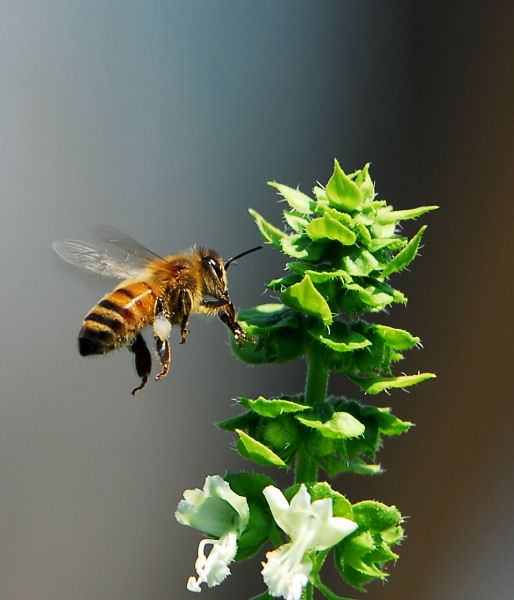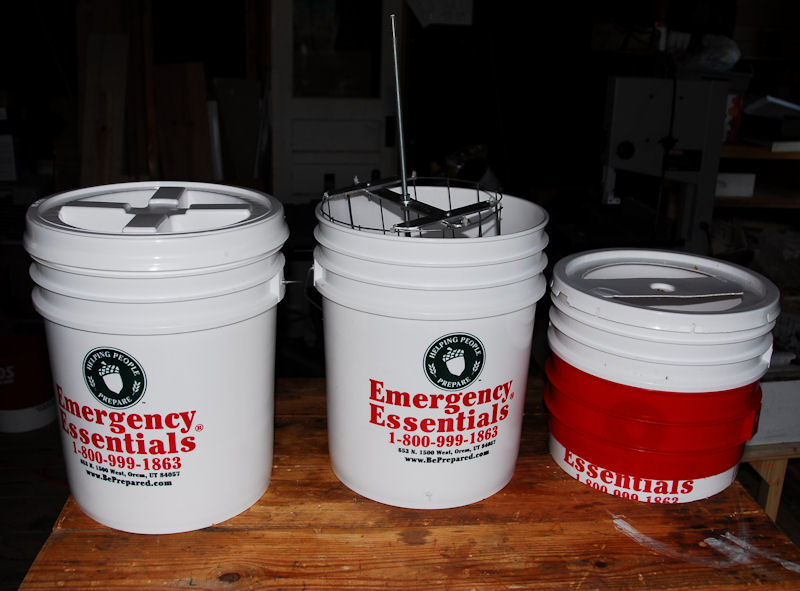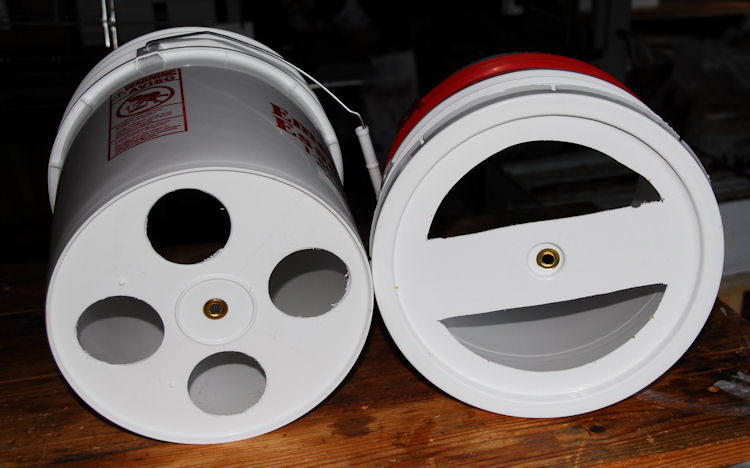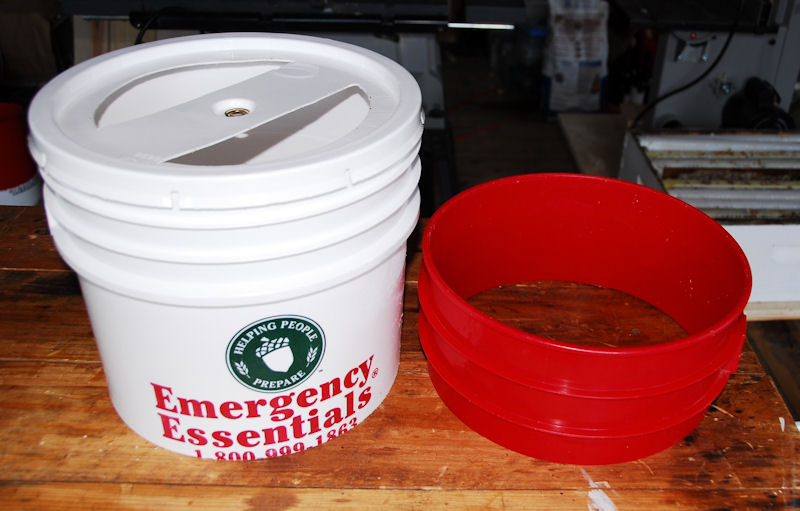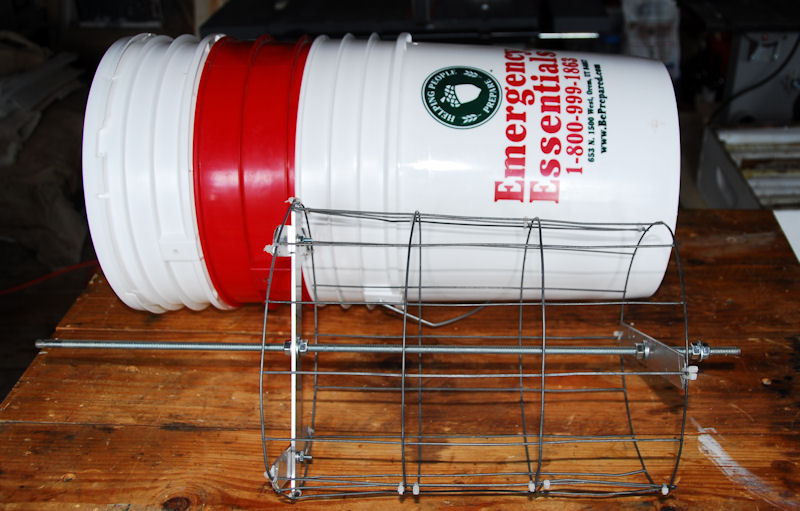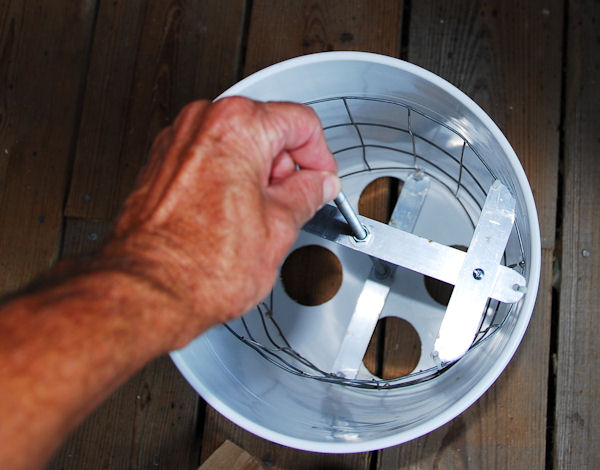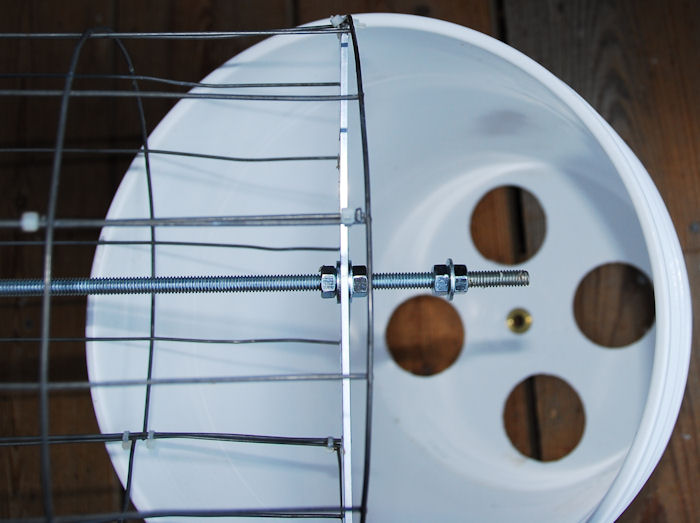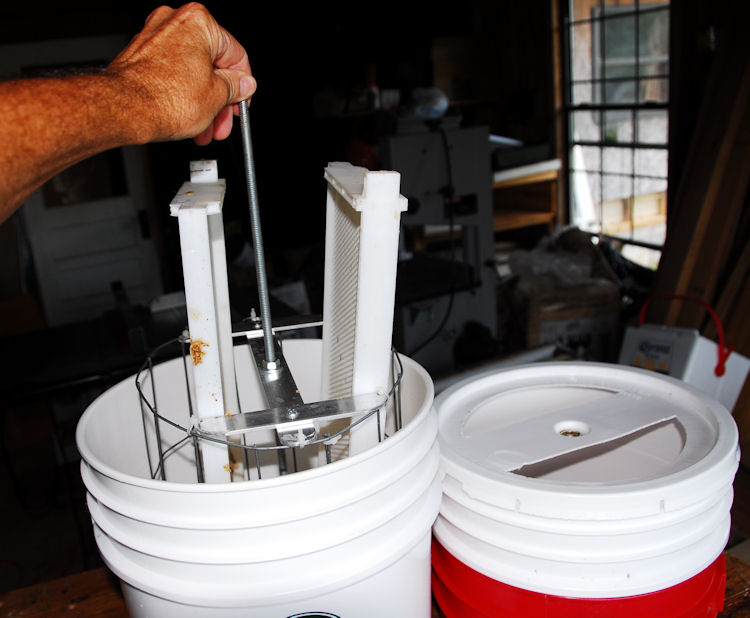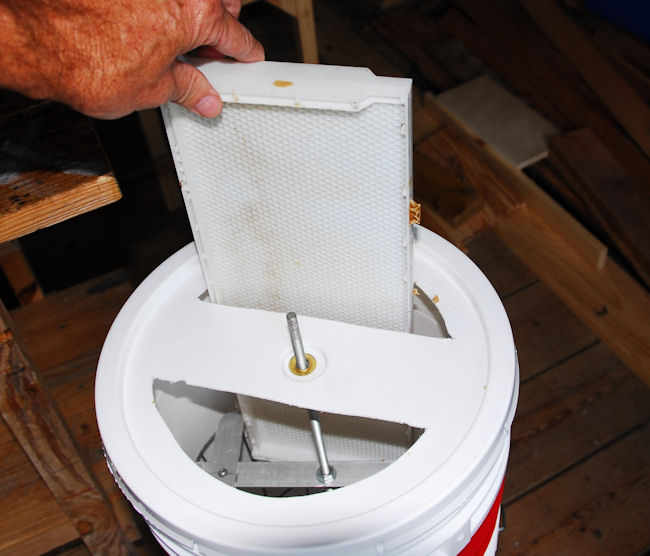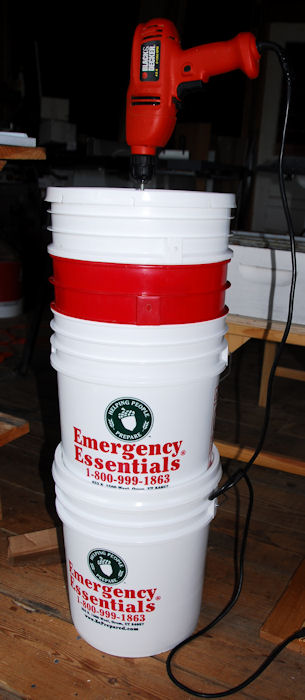General Discussion
Related: Editorials & Other Articles, Issue Forums, Alliance Forums, Region ForumsBEES!!! If you love them and want to give them a home, please check in.
BEES!
They seemed like a natural addition to our new life in Arkansas.
We arrived at our new home in the Ouiachita Mountains in Oct 2006.
Neither Starkraven nor myself had had any hands-on experience with bees.
During that first Winter, Starkraven researched bees (mostly online), and purchased a "Starter Kit" and two hive bodies online. She assembled the hives during the Winter, and in the Spring, the bees arrived via US Mail.
The postmaster of the small rural Post Office called us at 7AM,
and strongly encouraged us to get those Bees out of his Post Office ASAP.
My Wife introduce the Bees to their new home.
While she did everything according to the Book and wore a full Bee Suit,
it WAS very stressful. I took photos from a distance with a telephoto lens and shouted encouragement.
She must have done everything right, because the Bees decided to stay,
and we still keep bees from that original line.
As time and Seasons passed, we both became more and more fascinated with these insects, and took a course offered by the State, and later joined our local BeeKeepers Association.
While the bees are hearty and very good at taking care of themselves, they sometimes need some help.
We were lucky, and blundered through the first year on online research and love, but taking a course and joining the BeeKeepers Association has been invaluable, and we highly recommend it to anyone considering bees.
Our bees are very gentle (Italian/All Stars). We always wear protective hoods and gloves and use a smoker, but rarely put on the full suit. We do get stung on rare occasions (through the gloves or jeans), but it is no big deal anymore. I am considering trying BeeSting therapy for some arthritis in my hands .
We have gotten very comfortable with the bees, and inspect the hives every couple of weeks during the Spring/Summer. It takes about 10 minutes per hive. During the Winter, we rarely open the hives. ...only enough to make sure they have food (sugar water).

Our colonies are about 20 yards from the backdoor, visible from the house. There are plenty of bees around our house and gardens, but they have never caused a problem with us or our pets. Neither of us has been stung outside of messing with the hives.
There are many websites that offer full starter kits online.
I believe we ordered our original kits from Dadant,
but are setting up the jigs to build our own equipment,
which is relatively easy with basic carpentry skills and tools.
Here is some info based on our own experience we keep handy for anyone thinking about Bees.
We strongly recommend the following suggestions:
1) Check in with you County Extension.
They are very helpful. There are some regulations concerning transportation, registration, and inspection, and there may be some local ordinances. They are a great resource for latest research and new methods, pest & disease control. They can facilitate state hive inspections.
We generally avoid government agencies where ever possible, and have never voluntarily registered anything, but we make an exception for our bees. The benefits FAR outweigh any downside.
2)Join you local Beekeepers Association.
These are some of the most laid back people you will ever meet. Starkraven and myself are not joiners, but we look forward to our monthly meetings with the "bee people". This is another valuable resource for local information concerning pests, honey flows, equipment and disreputable operators. You can also pick up some hands-on experience working around hives.
Make no mistake...it is scary opening a hive the first time.
You will also be able to pick up some free localized bees from you local bee keepers. (Healthy colonies EXPAND, and many local bee keepers have all they want and are more than happy to give them away).
3)Always use new equipment
There are some very persistent pests and diseases that can be transmitted through the equipment. Used equipment abounds at some very attractive prices.
It is not worth the risk in my opinion. If you join the local association, some will offer you old equipment for FREE, but we always politely turn it down.
New Equipment is very reasonable, and there are many wholesalers and retailers online.
4)Do NOT to use flower scented deodorant or fabric softeners.
You would think this is Common Sense, but we found out the hard way.
5)Do NOT feed your bees Corn Syrup
There is no verifiable science to support this suggestion.
It is our personal preference. Corn is NOT a natural Bee Food.
Many BeeKeepers DO use Corn Syrup. It is cheap, the bees seem to like it, and the chemistry seems OK.
We refuse to use it, and will continue to do so until there is 100% proof that GM contamination absolutely can NOT
be transmitted to our Bees through Corn Syrup.
We use only 100% Cane Sugar to make our food solution,
and then only use it when necessary.
We strongly recommend the above suggestions.
Our fascination with our Bees continues to grow.
This is a wonderful site about BeeKeeping:
http://www.bushfarms.com/beesnewbees.htm
We don't always agree with him,
but love his attitude about Bees,
and his approach to natural BeeKeeping.
So far, we have adhered to more conventional methods,
but will try a Top Bar hive soon, maybe this season.
The End Product is beautiful,
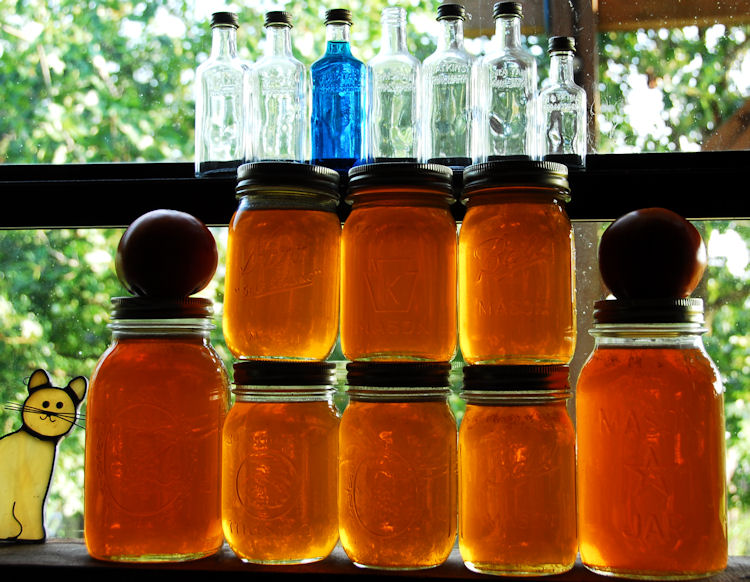
and you will have the satisfaction and security of KNOWING
that your Honey is 100% Pure, Natural Honey,
and NOT Corn Syrup that has been reprocessed through a Bee.
I would also like to encourage any DUers who are interested in BeeKeeping to follow their dream.
The more we learn about these mysterious creatures, the more fascinated we become.
I post information on Small Scale, DIY, BeeKeeping in the Rural/Farm Group.
If you are already a BeeKeeper,
or interested in Keeping Bees, please check in this thread,
or visit the Rural/Farm Group.
http://www.democraticunderground.com/1182412
thelordofhell
(4,569 posts)Esse Quam Videri
(685 posts)And the honey is just beautiful!
left on green only
(1,484 posts)The bee population of our planet is shrinking at an alarming rate and because of it our food supply is in peril. We are all connected together in a chain of survival here, and once a link is removed the chain will unravel and we will all perish.
Your orchard and garden are a beautiful sight to behold.
upon edit for second thought.
Esse Quam Videri
(685 posts)Is there a queen in each hive and do members of each hive get along with the members of the other hive?
bvar22
(39,909 posts)..and she IS the hive.
Queens can live for several years,
while the other Worker Bees and Drones (Male Bees) have a very short life.
Worker Bees, Females who are NOT the Queen, have a life expectancy during the Summer of about 90 days.
They literally work themselves to death of the good of the hive.
Health Bee Colonies expand, usually in early Spring, by producing New Queens and Swarming.
There is detailed information about new queens, swarming, and the duties of the Queen online.
It is fascinating.
Neighboring hives generally get along well.
They are usually of the same, of very similar, genetic background.
If one hive looses their queen, or drops in population for any reason,
the bees from a neighboring WILL come into the weak hive and steal the honey reserves.
One of the duties of a BeeKeeper is to keep the hives in a colony fairly balanced.
We do this by removing sealed brood (Bee larvae) from the hive with a large, healthy population,
and putting them in the weaker hive so that they will strengthen the worker population of the weaker hive.
Of course, this is only done once the cause of the population drop is determined NOT to be a chronic disease or pest.
HoneyBees generally don't fight each other,
but there are some species of bees that WILL,
but at this time, they are not common in North America (AFIK).
Africanized (Killer) Bees will not invade a healthy domestic colony and take it over by force.
The WILL try to mate with a domestic Queen when she is on her maiden flight,
and pass on their genetics in that manner.
In Central Arkansas, we are behind the Africanized line,
and take care to monitor our queens.
Once a queen has mated on her Maiden Flight she can carry all the sperm she will need for her lifetime,
and will never mate again.
If a BeeKeeper monitors the Queen,
and if there is ANY possibility that a NEW Queen has mated with a wild African Bee,
it is good practice to replace her with a certified Queen from above the Africanized Line.
This can be done online.
There are some gruesome videos on the National Geographic Channel about Giant Japanese Wasps attacking Bee Colonies
and wiping them out in a matter of a few hours.
Real Horror Show stuff.
pintobean
(18,101 posts)bvar22
(39,909 posts)One Love. One Heart.
southernyankeebelle
(11,304 posts)for honey and it paid well. She was really good at it. I am scared to death of bees. But I will tell you where she lived all the bees died out. We think its the spraying from the nursaries around here. They spray all the time. She didn't say anything because she didn't want to fight with the neighbors. The bees never came back.
Scuba
(53,475 posts)glinda
(14,807 posts)zentrum
(9,870 posts)This is a fine documentary about bees that came out last year and we need to help give it wide distribution. Go to their website.
Queen of the Sun.
MuseRider
(35,176 posts)but just this spring, there is a post in the gardening forum, I discovered a ton of them at the edge of the pond. I am just going to let them alone to do their thing for now, too much else to do to do it right I am afraid. They are certainly covering the wildflowers and the gardens. ![]() Never had I ever seen this kind of activity before. They did not like me walking through but I was gentle and they never left. I like bees, been stung before by a bumble bee about 6 times on my stomach and it hurt like crazy but was gone pretty quickly. I was thrilled to see them.
Never had I ever seen this kind of activity before. They did not like me walking through but I was gentle and they never left. I like bees, been stung before by a bumble bee about 6 times on my stomach and it hurt like crazy but was gone pretty quickly. I was thrilled to see them.
I love this post. Very informative and I will bookmark it because if I ever catch up with everything I would love to do this. Your honey is lovely.
wryter2000
(47,940 posts)Someone found a wild hive and somehow moved it to the roof of the church. Now, we get holy honey. Very cool. This is in downtown Oakland, CA, btw, across the street from Lakeside Park.
I wish I had more bees at home. I have to hand pollinate my squashes.
tabbycat31
(6,336 posts)I know that it something that I could never do (I am deathly allergic to bee stings).
JDPriestly
(57,936 posts)They show up when the sorrel under my fruit trees bloom and they stick around for my tomatoes and squash. I love them.
I think I have some of different kinds, but maybe a lot of the type that live in holes in the ground.
It may be that I have hives in a narrow strip of thick hedges toward the back of the lot. I've never seen a hive.
Marrah_G
(28,581 posts)rainy
(6,319 posts)<iframe width="560" height="315" src="
" frameborder="0" allowfullscreen></iframe>sabrina 1
(62,325 posts)bvar22
(39,909 posts)Thanks.
We may "borrow" some of the art.
DocMac
(1,628 posts)Utah is the Beehive State. ![]()
jtuck004
(15,882 posts)started buying honey from the local beekeepers.
I was astounded at the difference in taste, won't ever go back.
Liberal_in_LA
(44,397 posts)MindMover
(5,016 posts)wonderful post....
denbot
(9,949 posts)We did a cutout on a wild hive that settled into a stored van stove/refrigerator to a Langstrom hive I built. This is now week two in the new hive and the girls seem to be adjusting to their new home quite well.
Video of our hive I took a few minutes ago.
A still picture I took as well.
[IMG]
 [/IMG]
[/IMG]
bvar22
(39,909 posts)Love the Hive Art,
and excellent job on the body construction!
I agree that if the Bees are bringing in pollen,
they have a viable Queen, and intend to stay.
Unfortunately, we are behind the Africanized Line,
and can not afford to capture wild colonies.
The recommended State Policy is to destroy them.
![]()
pasto76
(1,589 posts)which are just as, if not more important! there are a lot of good web sites about native pollinators. Do a google search. most of them are solitary and hence, no honey...and no money. Which is why they are largely overlooked. They come in all sizes. Seen those little metallic green fly lookin things on your flowers? yeah, those are mason bees. an important pollinator.
If you found the OP interesting, do yourself a favor and find a patch of native flowers, be still, and really look to see how many different bees there are. You will not BEE disappointed
harmonicon
(12,008 posts)
Mojorabbit
(16,020 posts)but I do get stung occasionally. You learn to tell when they are pissy and when they are fine to approach. I love having all that honey. I am learning to make mead with the excess. Good luck with yours!
bvar22
(39,909 posts)If we listen to The Bees, they will tell us when NOT to mess with their hive.
We aren't certain what causes this, perhaps an earlier alert that put the defensive pheromones in the air. When they sound angry, and the guard bees start buzzing us when we approach the hives,
we postpone any hive work for a day, and leave them alone.
We have discovered that if WE stay calm, the Bees usually stay calm.
In the early days, when it was a scary experience opening the hives,
they seemed to be able to sense OUR fear, and reacted accordingly.
As time passed, and servicing the hives and experiencing the occasional sting became routine,
we stayed calmer, and so have the Bees.
I can't recall a single occasion over the last 5 years when either of us has been stung outside of messing with the hives. We even mow and use weed eaters and chain saws near the hives, and have not had a problem so far.
We usually put on a bonnet and gloves when we do so.
I don't mind getting stung a few times,
but don't want to get stung 500 times.
You may be interested in this.
It is a low cost DIY Honey Extractor (centrifuge) made from food grade plastic buckets that we put together a couple of weeks ago.
We used it last week, and it worked great.
It worked better than our expectations.
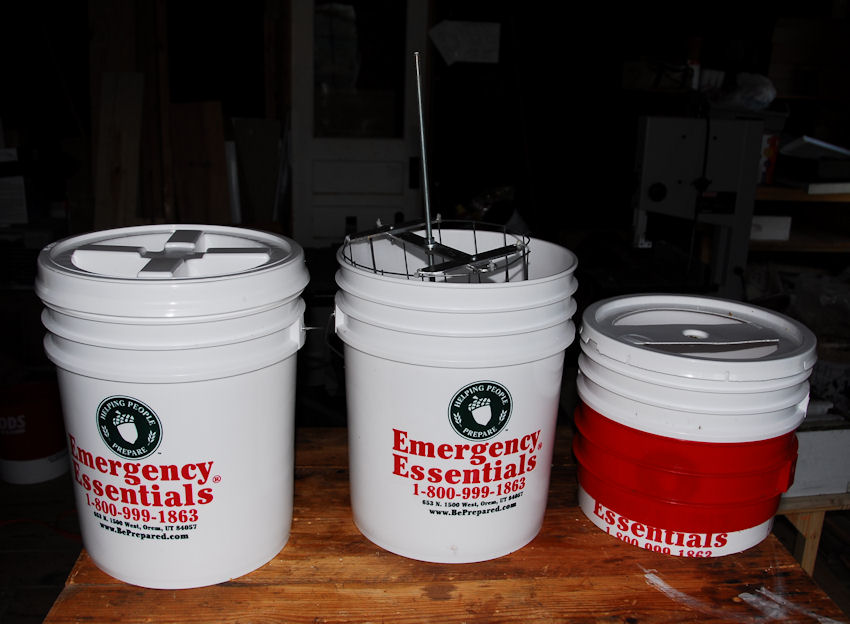
This will spin out two super frames at a time,
and is perfect for the small scale BeeKeeper.
We can't take credit for the concept,
but we did make significant improvements to the ones on the Internet.
I will be posting the plans and a pictorial guide in the Rural/Farm Group,
and the DIY Group.
I went all out and bought a stainless maunal centrifuge when I got my first hive. I wish I had known about this! I just split a hive and am watching it to see if it will take or not! ![]() And yes it is so true, you get to know your bees and you observe and listen and that is half the secret to successfully keeping them.
And yes it is so true, you get to know your bees and you observe and listen and that is half the secret to successfully keeping them.
jwirr
(39,215 posts)will have to take the MN cold with the heat.
bvar22
(39,909 posts)We used to live in Minnesota,
and hold that state close to our hearts.
We MISS the stark beauty of the Minnesota Winter.
Good Luck with your Bees.
I defies belief that they can survive a Minnesota Winter,
but they can.
Check in the Rural/Farm Group.
I will post info on Small Scale Decentralized, Organic BeeKeeping there.
We recently built a low cost DIY Honey Extractor (centrifuge) that worked beyond our expectations.
You won't need it this year, but maybe next year.
I posted a photo of it up thread,
and will post the plans and photo guide in the Rural/Farm & DIY Forums in a few days.
jwirr
(39,215 posts)think our biggest danger could be from bears. We fensed to hives in and hope that works.
bvar22
(39,909 posts)We are surrounded by extensive National Forest (Ouachita Forest) and protected Wilderness.
The Black Bear population is high,
and the heat & drought the last two years have killed off most of the wild (Black) Berries,
forcing the bears to look for other sources of food.
Electric fencing has solved the problem for the BeeKeepers here that have had their hives tumbled.
If we have a Bear problem, we will use the electric fencing,
but so far, so good.
Where in Minnesota are you?
jwirr
(39,215 posts)bvar22
(39,909 posts)We lived in St Paul (1999 - 2006), and never passed up a chance to head north to Duluth, The Arrowhead, Eli, The Iron Range, and the Boundary Waters Area. We made the trip several times in the dead of Winter, and it was purely breathtaking!
We still listen to Prairie Home religiously, every Sat Evening.
If you are ever in our area, drop in for Fresh Green Beans and Cornbread!
![]()
jwirr
(39,215 posts)the growing season is very short but in the last years even that has changed. The invite is returned although I doubt I can serve such great fare.
Odin2005
(53,521 posts)If I see a bee or wasp I will panic and scream like a little kid.
But that honey looks nummy and that kitty decoration is cute!
Blue_Tires
(57,596 posts)keep them far, far away from me plzkthxbai
Solly Mack
(96,770 posts)Thanks for sharing this with us!!
XemaSab
(60,212 posts)They like it back there and they are very happy. ![]()
arikara
(5,562 posts)I took a course a few years ago but it actually put me off doing it, at least so far. So much of it had to do with the chemicals they use on the bees themselves which really turned me off. Are you using any chemicals for varoa mites and the other diseases? Another thing I hadn't considered is the fact that we have bears around and I would have to do something to protect the hive from them.
Last year there were lots of bees on my plants but this year for some reason not so many. I'm hoping that its just because its colder than normal but I am very concerned about them.
bvar22
(39,909 posts)We use a strictly organic approach to BeeKeeping, and everything else.
Two years ago, we observed some Veroa Mites in one of our colonies.
We put some patties made up of Crisco and Menthol on newspaper in the top of this hive.
Apparently, the mites don't like the menthol, but the bees are OK with it.
We then sprinkled Powered Sugar over the frames in the hive body.
The theory is that the powdered sugar makes the bees too slippery for the Veroa Mites to hang on,
and when they fall off, they fall through the screens on the bottom, on to the ground,
and can't get back into the hive.
So far, this has worked for us.
One problem with the County Extensions,
they tend to push chemicals.
We are surrounded by the Ouachita National Forest,
and Black Bear populations are high here.
Other Beekeepers in this area have had problem bears topple their hives.
Electric Fencing has solved their problem,
and is what we will do if Bears become a problem here.
Uncle Joe
(64,809 posts)Thanks for the thread, bvar. ![]()
stuntcat
(12,022 posts)Someone helped her get all the equipment and came and set it up, now she says it's easy!
I'd love to do it. I'm in a very close cul-de-sac with toddlers all over the place so I don't have a place for it. But I've got a good garden so I get lots of bee action anyway.
I thank the bees for every bite of food I take ![]()
Horse with no Name
(34,228 posts)I have always loved the pics of your gardens and bees and the fruits thereof. I wish I had half the dedication to the earth as you do.
Keep up the good work. The planet appreciates folks like you!
bvar22
(39,909 posts)We are grateful that we were given the opportunity to do this.
Ever since we made the decision to Take the Leap in 2005
The Fates have been good to us.
It is like we picked up a benign Tail Wind,
and things just fell our way.
When we look back, and think of all the things that could have gone wrong, and didn't.
we feel very lucky.
Like most of the people in the USA, we are just one accident, one illness, one frivolous lawsuit, one mistaken arrest,.... one simple twist of fate away from losing everything.
We try to remember this, and find gratitude for every single day we can do this,
and if it all falls apart, we will have the memories and gratitude for the experience to comfort us.
My Wife says that I have not been honest in my Photo Posts at DU.
She says I only show the "good stuff", and compose my photos to show everything in the very best light with the best background.
She says that I haven't shown the failures,
the crops that were eaten by insects,
the chicks that died from respiratory illnesses,
the ones we had to euthanize for congenital deformities,
the young roosters we had to "cull",
the brown, burnt fields from the drought and heat waves of the last two years,
the Bee Colony that died of starvation two Winters ago because we weren't paying attention,
the fruit trees that died from trunk borers because we didn't know to paint the trunks,
the dead deer, gut shot in hunting season, that seem to find their way to our little pond to die,
the sweat and exhaustion and disappointment.
She has a valid point.
That IS very much a part of the whole.
Thanks again for the kind words.
Horse with no Name
(34,228 posts)And obviously...the good with the bad and all that...YET...despite all those things, you persevere through and bring forth a pioneer spirit of survival and bountiful harvests.
I am in awe. Thanks for sharing it all with us. ![]()
L0oniX
(31,493 posts)catchnrelease
(2,147 posts)We had a wild colony of honeybees living under the eaves of the garage behind our property. The hive was overgrown with creeping fig vines, so the colony was well hidden. Only my husband and I knew they were there. Since I have a couple of fruit trees, some berry vines and tons of native CA plants/flowers, the bees were in heaven here. We enjoy having them come and of course pollinate while they're here. There are also lots of native bees that come.
There were several times that the colony split off and swarmed away. I think at least twice some went into the neighbors garage and sadly they had them sprayed. That was before I'd found someone to safely remove swarms. I would have paid for it to be done had I known. And twice we had swarms settle in our backyard, and I did have info for a woman who came and took the swarms to set up elsewhere.
Eventually the original colony left. I tore out all of the vines to see if I could tell what might have happened, but there were no dead bees, just the old looking comb was left. I have asked a couple of beekeepers about it and they have said it is hard to say. Could have just been the colony no longer liked the location. I was really sad to see them go. We still have tons of bees around, but I don't know where their hive is.
In April, at a garden event here in So Cal, I met a beekeeper that was really informative. He is totally organic like you, no mititicides etc. He is willing to set up a hive at a persons home, maintain it, harvest the honey etc. Basically do all the work and share the honey with the homeowner, I believe for a fee. Or he will teach you to do it yourself. This tempts me. I wish the 'garage' colony was still here, maybe he could have set it up and saved it. His website has lots of interesting bee info.......
.http://www.guerillabeekeepers.com/index.shtml
Good luck with your girls!
on edit--I tried some of the honey collected by this beekeeper, from his local bees and it is out of this world. I have never actually really liked the taste of honey by itself, only in tea, but this had me licking the spoon!
Omaha Steve
(108,942 posts)4th law of robotics
(6,801 posts)I've done it before but not so easy in a city (in a rented place at that).
whatchamacallit
(15,558 posts)Arkansas Granny
(32,265 posts)from last month? My daughter hasn't checked back with the guy yet to see how they worked out, so I'm still waiting on an update.
http://www.democraticunderground.com/1018100072
Carolina
(6,960 posts)and for your efforts to keep bees healthy and thriving.
If I lived in the counrty, I'd surely follow your lead.
Thanks again![]()
![]()
Javaman
(65,568 posts)I started my first hive this spring. All is going well. ![]()
http://suburbandweller.blogspot.com/2012/04/buzzzzzzzzzzzzpart-1.html
bvar22
(39,909 posts)Congratulations.
I will be posting Bee related stuff in the Rural/Farm Group:
http://www.democraticunderground.com/?com=forum&id=1182
Please check in there,
and let us know how it is going for you.
If you are going to do it small scale like us,
you will be interested in this, hopefully next year.

This is a very low cost, easy DIY Honey Extractor (Centrifuge) we put together a couple of weeks ago, and used it last week.
http://www.democraticunderground.com/1182412
It worked better than we expected,
and made a tedious, messy task much, MUCH easier.
I will post plans and photo guide in Rural Farm in a few days.
Good Luck!
Javaman
(65,568 posts)How did you make it?
bvar22
(39,909 posts)I can't take credit for the concept.
There are several DIYs using these Food Storage buckets at:
http://www.instructables.com/
(Great Site)
....but I made several improvements.
I will post a Step by Step with photos in the Rural/Farm Group and the DIY Group.
I haven't finished the text yet, but here are the basics:
The core is 3 Food Grade Storage Buckets with Tops,
and a 3 foot threaded 3/8" steel rod available from most Hardware Stores,
6- nuts & washers to fit the rod,
and a couple of small nuts and bolts to hold the small end pieces on the top spreader bar.
The basket is 2" X 4" welded fence wire bent into a cylinder.
Aluminum Bar Stock (available at most Hardware Stores) was used to as spreaders in the basket,
and as bottom support for the honey frames.
2- 3/8" brass grommets were used as bearings to support and centralize the rod.
It will comfortably spin out 2 super frames at a time.
The bucket on the left has the optional Screw On top, and is used as is to catch the honey.
The Optional Screw on Top has a support ring that snaps tightly on the top of this bucket that also happens to prevent the next bucket from sliding down inside more than 2 inches when stacked.
Perfect for supporting the next bucket in the stack. You may choose to simply screw on the lid after you spin out your honey for storage.
A spigot could be added to the bottom of this bucket, but we simply poured out the honey through a screen into jars.
The only modifications to the middle bucket was 4- 2-1/2" holes drilled (Hole Saw attachment for a hand drill) in the bottom to let the honey run into the bottom bucket,
and a 3/8" hole drilled in the center of the bottom with a 3/8" Brass Grommet inserted through this hole.This brass grommet will support the basket assembly, and help center the rod & basket while spinning.
Use the grommet kit with the Steel Dies, and NOT that cheesy pliers thing that comes with some kits. (That thing is worthless.) You will need a long drift to hammer in this grommet as securely as possible. (I used two 3/8" extensions from a socket set).
Even with the 4 holes, the plastic bottom of this Storage Bucket was tough enough to do the job.
The bucket on the right is the top bucket.
I used a table saw with a finishing blade to cut the bottom 4" off,
but any saw will do the job.
The red ring is the top of a regular bucket, and serves only as a spacer. It doesn't need to be Food Grade since the honey never touches it. It is simply a spacer sleeve that keeps the buckets from stacking into each other.
The top of this bucket is a standard Snap On top, not the optional a Screw OnTop.
It also has a 3/8" Brass Grommet hammered in the center,
and two crescent holes cut for inserting and removing the frames without taking the top off.
The basket is fairly simple.
I used 2" X 4" welded wire fencing, since I have plenty of that around,
but I suppose Chicken Wire or Hardware Wire, or just about anything would work.
The spreaders are made from aluminum bar stock which is available at almost any Hardware Store,
and is easy to cut and shape with a hand grinder.
Some care should be take here to make things as smooth, balanced and centered as possible.
Nylon Wire Ties hold everything together.
Note the extension at the end of the rod.
The tip of the rod will pass through the brass grommet at the bottom of the bucket,
but the nuts and washer won't, providing a rudimentary but effective bearing support and centralizer for the bottom of the assembly.
There is also a gap between the bottom of the basket and the bottom of the bucket so that there is space for the honey to run out through the 4 holes without being disturbed by the spinning basket.
You can make fine tuning adjustments by winding the nuts up or down the rod until you are satisfied with the spacing. Then lock all the nuts tightly against each other to hold everything in place.
The basket itself needs to be only slightly longer than 1/2 the length of the honey frame.
It is best to keep thing as light as possible.
I added the two shorter pieces of aluminum at the end of the spreader bar to keep the frames centered in the basket, and ground off the ends to match the curvature of the bucket.
Aluminum is easy to shape with a hand grinder.
(Wear Eye Protection!)
Before final assembly, the basket assembly can be balanced by supporting both ends of the rod on blocks.
The heavy side will roll to the bottom,
and weight can be added (Nuts, pieces of wire, wire ties ect.) to the top until the basket assembly shows no major bias.
The crescent cut outs on the top lid allow frames to be changed or turned without removing the lid.
After the final assembly and spacing adjustments are finalized,
extra rod at the top can be cut off for easier use.
We powered our spinner with a common hand drill.
We remove the caps from the sealed honeycomb by raking them with a fork
taking care to damage the HoneyComb as little as possible.
We found no need for an expensive and messy De-Capper.
We return the spun Out frames to the hives for refills ASAP.
Frames full of capped honey are surprisingly heavy.
Start slow.
The full frames WILL be out of balance.
Turn the frames around a couple of times to empty the backsides.
As they get lighter higher speeds are possible.
We were very satisfied with the job this did.
We half believed that it would shake itself apart, but it didn't.
It was surprisingly smooth, easy to operate without a lot of mess and bother,
and showed no detectable wear after its first use.
Javaman
(65,568 posts)Thanks for the process and instructions.
In the bottom container, where the honey drips into, do you use a filter at all?
I can't tell you how jazzed I am to make one of these. Would you mind if I link to this thread for your instructions on my next blog?
bvar22
(39,909 posts)We did use a panty hose filter when pouring the honey from the bottom container into the quart jars. It would be simple to add a filter between the two buckets.
Any cloth mesh type filter stretched over the opening of the top of the bottom bucket would be held in place by the bottom of 2nd bucket.
If the centering stinger on the bottom rod is kept short enough,
it shouldn't even touch the filter which would be pushed down a couple of inches by the 2nd bucket when it is placed on the stack.
The restrictions caused by the mesh might cause the honey to back up to the level of the bottom of the spinning cage. If so, just take a break['/i] until the honey clears itself through the filter.
Please feel free to link to the post and use the photos.
I am considering posting it to Instructables.Com where we found the concept.
We made some major refinements, such as the brass grommets, centering stinger on the end of the rod, and basket construction.
Good Luck with your project.
The buckets are available from the label on the front. They have a Website where we ordered ours. The Snap On Retainer Ring for the Screw On Top on the bottom bucket was the perfect circumference to prevent the 2nd bucket from telescoping more that 2" inside.
It is a perfect fit.
I can't vouch for any other buckets.
Get the Screw On top for the bottom, and one regular Snap On top for the top.
IIRC, the buckets were inexpensive ($3.00 + Shipping ?),
the 3' threaded 3/8" rod = about $7.00
The aluminum bar stock, 3' for $7.00
I suppose that wood could be used here without problems,
it would be easier to drill and shape too.
These are wonderful buckets for other uses too.
We like to buy some food in bulk,
and are considering ordering a couple of more Screw On Top Buckets for food storage.
The Screw On Top makes access easy, unlike the old Snap On Lids which require two hands and some straining and fumbling to use and seal properly.
Javaman
(65,568 posts)I have an 8 frame hive an I will soon need to get a regular feeder for my bees. Right now I use a quart mason jar with tiny holes punched in the lid and then invert it over the opening of the inner cover. (I have it inside a super)
Everything is working well, however, I'm adding my first super frames (above my upper deep) at the end of this week and eventually I will be getting second super (no frames) at the end of the week. I'll need to add frame to the second super at some point and I'm trying to figure out what is the best way to feed the bees.
What sort of feeder do you use?
Should I get another super and keep doing what I'm doing with the mason jar? or should I invest in a top feeder? I've looked a at few and I'm not sure which to get.
LadyHawkAZ
(6,199 posts)I like bees. And I greatly appreciate those willing to care for hives.
But I'm phobic about flying insects. So how about I just give a cheer to the beekeepers of the world, and back away slowly... will that help?
Egalitarian Thug
(12,448 posts)kentauros
(29,414 posts)I have this CD, mostly because I love Layne's drumming music. You can get a taste at the link, due to sampled cuts. Also read about why there's a connection between the ancient Greeks, bees, and drumming
Old Troop
(1,991 posts)Do your bees help local agriculture?
Is bee-keeping viable in New England?
Can you pat their furry little heads?
bvar22
(39,909 posts)There IS no local agriculture within their foraging radius, about 3 miles.
We purposely chose a place that had no local agriculture (or neighbors)
because most farmers (and neighbors) use pesticides that hurt Bees.
We live in a very rural part of the Ouachita Mountains, Arkansas,
surrounded by national Forest and protected wilderness.
The Bees DO help our fruit trees, berry plants, and melons,
but surprisingly few other veggies.
I presume it is.
I know BeeKeepers in Northern Minnesota (this thread ^),
and on the eastern plains of Montana.
I suspect they can survive and thrive in New England.
Check you Local County Extension,
or the phone book for a local Bee Keepers Association.
If they are not viable in New England,
check out my other Dream Job,
a Light House Keeper!
Oddly enough, the answer is YES,
if you are so inclined.
Many Bee Keepers tend their hives bare handed.
We don't. We use gloves,
but domestic Honey Bees in a calm state are surprisingly gentle.
I have held Queens in the palm of my gloved hand,
and once observed a Bee Keeper stroke/pet her Queen bare handed.
Capn Sunshine
(14,378 posts)Not on purpose, they moved in to a pepper tree on the edge of our yard. They have been there three years now. Never bothered us or the dogs. I only wish I could get the honey.
I'm thinking of getting a top bar hive myself.

bvar22
(39,909 posts)...and will probably include one in the future.
It is certainly more natural, and the Bees seem to like them.
Harvesting the honey from Top Bar Hives is difficult, time consuming, messy,
and destroys the Honeycomb.
All the methods we are familiar with require the comb to be crushed and pressed.
We try to preserve the honey comb as much as possible, and give it back to the Bees ASAP.
The Bees don't have to spend time and resources rebuilding the comb,
and start refilling with honey much sooner.
